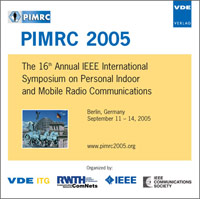IEEE 802.11k: Improving Confidence in Radio Resource Measurements
Konferenz: PIMRC 2005 - 16th Annual IEEE International Symposium on Personal Indoor and Mobile Radio Communications
11.09.2005 - 14.09.2005 in Berlin, Germany
Tagungsband: PIMRC 2005
Seiten: 5Sprache: EnglischTyp: PDF
Persönliche VDE-Mitglieder erhalten auf diesen Artikel 10% Rabatt
Autoren:
Mangold, Stefan (Swisscom Innovations, Berne, Switzerland)
Berlemann, Lars (Chair of Communication Networks, ComNets, RWTH Aachen University, Germany)
Inhalt:
New radio resource measurements for the wireless local area network IEEE 802.11(TM) standard are defined in the standard extension IEEE 802.11k. Various types of measurements are defined that enable 802.11 stations to request measurements from other stations, for example in order to measure how occupied a frequency channel is. The measurement results are reported back to the requesting station in standardized frames. In this paper, we discuss how relevant and useful measurement results are in general. A method to estimate the confidence of such measurement results is proposed. It is proposed to apply the concept of confidence intervals to 802.11k radio resource measurements, similarly to how they are applied to stochastic simulation, where estimating the confidence of results is necessary to provide meaningful data. Our proposed method allows optimizing measurement durations and determining the optimal repetition rate of measurements. The method also allows estimating how long after the end of a measurement the reported results will represent the true reality.


